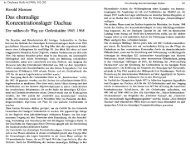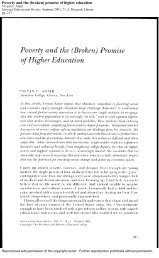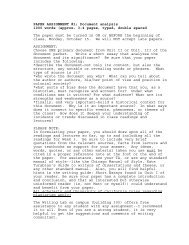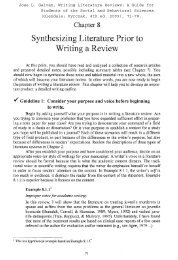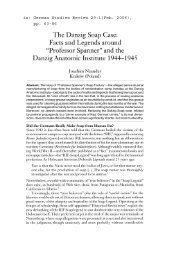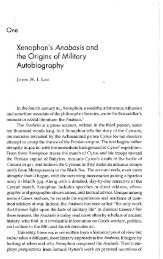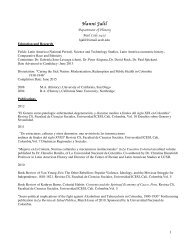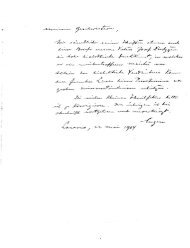DISASTER IN DARFUR - UCSB Department of History - University of ...
DISASTER IN DARFUR - UCSB Department of History - University of ...
DISASTER IN DARFUR - UCSB Department of History - University of ...
You also want an ePaper? Increase the reach of your titles
YUMPU automatically turns print PDFs into web optimized ePapers that Google loves.
6<br />
The Price <strong>of</strong> Impotence<br />
When the British departed in 1956, they left behind the Sudan Defense Force soon<br />
to become the Sudan Armed Forces (SAF). It was a disciplined, pr<strong>of</strong>essional, mobile<br />
army, the finest in the Middle East, equal to the Arab Legion <strong>of</strong> Jordan. In the Arab-<br />
Israel War <strong>of</strong> 1967 the Sudanese battalion sent to Sinai to help the Egyptians refused to<br />
retreat, disdained to surrender, and had to be annihilated before the Israeli advance could<br />
proceed. Moreover, the British found their best soldiers from the peoples <strong>of</strong> the<br />
periphery--the Nuba and Dinka <strong>of</strong> the southern Sudan and the Fur and Baqqara from<br />
Darfur who had established a reputation as warriors during the Mahdiya and their<br />
sporadic outbursts against the British--for the sons <strong>of</strong> the awlad al-bahar preferred the<br />
urban life <strong>of</strong> the riverain towns and a political or pr<strong>of</strong>essional career to the hardships and<br />
hazards <strong>of</strong> soldiering. In 1956 the army was, in fact, the only national institution in the<br />
Sudan and in the past half-century <strong>of</strong> Sudanese independence has intervened three times<br />
in 1958, 1969, and 1989 to seize power from incompetent, corrupt, and self-seeking<br />
political leaders democratically elected. At the time <strong>of</strong> their respective coups most<br />
Sudanese were delighted to see the politicians depart from government until later<br />
realizing the tyranny <strong>of</strong> military dictatorships that have ruled the Sudan for thirty-seven<br />
<strong>of</strong> its forty-eight years <strong>of</strong> independence. The decline <strong>of</strong> the Sudan Armed Forces began<br />
during the sixteen years <strong>of</strong> the rule <strong>of</strong> General Ja‘far Numayri (1969-1985) when the<br />
senior <strong>of</strong>ficers <strong>of</strong> the Sudan Defense Force were succeeded by younger, less pr<strong>of</strong>essional<br />
<strong>of</strong>ficers who could not resist abusing their authority for their own personal advancement<br />
at the same time fighting a war they could not win against the southern Sudanese<br />
insurgents. Moreover, the demise <strong>of</strong> a pr<strong>of</strong>essional Sudanese fighting force was





